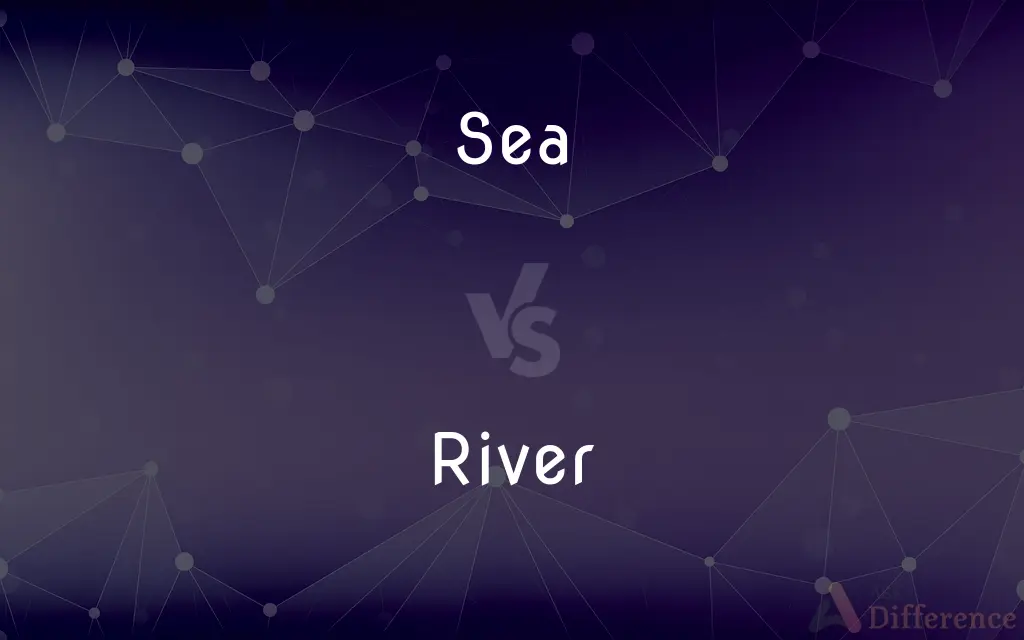Sea vs. River — What's the Difference?
By Tayyaba Rehman — Updated on November 2, 2023
Seas are large saline bodies of water enclosed by land, while rivers are freshwater streams flowing towards oceans, seas, or lakes.

Difference Between Sea and River
Table of Contents
ADVERTISEMENT
Key Differences
Seas are expansive bodies of saltwater, larger than bays, and partially enclosed by land. Rivers are typically freshwater courses, flowing from higher to lower terrain, and emptying into larger bodies of water. Seas can be part of the oceans and are often connected to them, featuring saline water due to the evaporation process which leaves salts and minerals behind. Rivers, on the other hand, are fed by rainwater, springs, or snowmelt from mountains and are crucial for inland ecosystems.
Seas often serve as natural borders between countries and are critical for global trade, supporting international shipping routes. Rivers also play a key role in transportation, particularly in historical contexts and in regions where other forms of infrastructure may be limited. The sea, with its vastness and depth, supports diverse marine life and ecosystems that are distinct from those in rivers. Rivers are dynamic systems, constantly changing their courses and shaping landscapes through erosion and deposition, supporting freshwater habitats.
In terms of use by humans, seas have been crucial for exploration, maritime travel, and as sources of food and economic resources such as oil and natural gas. Rivers are essential for human settlements, providing water for drinking, agriculture, and industry. Historically, civilizations have flourished along rivers. The sea's tides and waves are driven by gravitational forces from the moon and sun, which is not a phenomenon observed in rivers. Rivers, however, are influenced by precipitation, terrain, and seasonal variations in water flow.
Seas are often studied in the context of marine biology and oceanography, while rivers are a focus for freshwater biology and hydrology. The sea, with its wide range of climates from polar to tropical, affects global weather patterns, whereas rivers have more localized impacts on landscapes and ecosystems. Both seas and rivers are crucial to the global water cycle, but their roles and characteristics are distinct.
Comparison Chart
Water Type
Saline
Freshwater
ADVERTISEMENT
Enclosure
Partially surrounded by land
Flows across land
Connection to Ocean
Often connected to an ocean
Typically flows into a sea or ocean
Ecosystem Type
Marine ecosystems
Freshwater ecosystems
Role in Transportation
Major routes for international shipping
Used for local and regional navigation
Biodiversity
Supports marine life
Supports freshwater organisms
Salinity
High due to evaporation and mineral deposits
Low, derived from rainwater or snowmelt
Human Settlements
Typically not settled, but crucial for trade
Often settled alongside for resources
Depth
Generally deeper
Shallower, varies along the course
Impact on Weather
Affects global climate
Impacts are more localized
Compare with Definitions
Sea
A vast body of saltwater, smaller than an ocean.
The sea roared under the tempest.
River
A freshwater flow of substantial volume.
Rivers crisscross the landscape like veins.
Sea
A region of the ocean partially enclosed by land.
The Red Sea is known for its rich marine biodiversity.
River
A large natural stream of water flowing in a channel to the sea, a lake, or another river.
The Mississippi River flows into the Gulf of Mexico.
Sea
A state of huge quantity or vastness.
There was a sea of people at the concert.
River
Symbolizing the flow of time or events.
Life is a river that keeps flowing forward.
Sea
Used to describe turbulent or difficult situations.
He's been at sea with his feelings since the incident.
River
A force of nature shaping the land.
The river carved a canyon over millennia.
Sea
The sea, connected as the world ocean or simply the ocean, is the body of salty water that covers approximately 71 percent of the Earth's surface. The word sea is also used to denote second-order sections of the sea, such as the Mediterranean Sea, as well as certain large, entirely landlocked, saltwater lakes, such as the Caspian Sea.
River
A source of nourishment and growth.
The river of knowledge at the university seemed endless.
Sea
The continuous body of salt water covering most of the earth's surface, especially this body regarded as a geophysical entity distinct from earth and sky.
River
A river is a natural flowing watercourse, usually freshwater, flowing towards an ocean, sea, lake or another river. In some cases, a river flows into the ground and becomes dry at the end of its course without reaching another body of water.
Sea
A tract of water within an ocean.
River
A large natural stream of water flowing in a channel to the sea, a lake, or another river
The Mekong River
River pollution
The River Danube
Sea
A relatively large body of salt water completely or partially enclosed by land.
River
Abbr. R. A large natural stream of water emptying into an ocean, lake, or other body of water and usually fed along its course by converging tributaries.
Sea
A relatively large landlocked body of fresh water.
River
A stream or abundant flow
A river of tears.
Sea
The condition of the ocean's surface with regard to its course, flow, swell, or turbulence
A rising sea.
Choppy seas.
River
The fifth and last of the community cards in various poker games, especially Texas hold'em.
Sea
A wave or swell, especially a large one
A 40-foot sea that broke over the stern.
River
To win a hand in poker by beating (someone) on the basis of the last community card that is turned up.
Sea
Something that suggests the ocean in its overwhelming sweep or vastness
A sea of controversy.
River
A large and often winding stream which drains a land mass, carrying water down from higher areas to a lower point, oftentimes ending in another body of water, such as an ocean or in an inland sea.
Occasionally rivers overflow their banks and cause floods.
Sea
Seafaring as a way of life.
River
Any large flow of a liquid in a single body.
A river of blood
Sea
(Astronomy) A lunar mare.
River
(poker) The last card dealt in a hand.
Sea
A large body of salt water.
River
(typography) A visually undesirable effect of white space running down a page, caused by spaces between words on consecutive lines happening to coincide.
Sea
The ocean; the continuous body of salt water covering a majority of the Earth's surface.
River
One who rives or splits.
Sea
A body of salt water smaller than an ocean, generally forming part of, or connecting with, an ocean or a larger sea.
The Mediterranean Sea, the Caribbean Sea, the Sea of Crete, etc.
River
(poker) To improve one’s hand to beat another player on the final card in a poker game.
Johnny rivered me by drawing that ace of spades.
Sea
A lake, especially if large or if salty or brackish.
The Caspian Sea, the Sea of Galilee, the Salton Sea, etc.
River
One who rives or splits.
Sea
The swell of the sea; a single wave; billow.
River
A large stream of water flowing in a bed or channel and emptying into the ocean, a sea, a lake, or another stream; a stream larger than a rivulet or brook.
Transparent and sparkling rivers, from which it is delightful to drink as they flow.
Sea
Living or used in or on the sea; of, near, or like the sea.
Seaman, sea gauge, sea monster, sea horse, sea level, seaworthy, seaport, seaboard, etc.
River
Fig.: A large stream; copious flow; abundance; as, rivers of blood; rivers of oil.
Sea
(figurative) Anything resembling the vastness or turbulence of the sea.
River
To hawk by the side of a river; to fly hawks at river fowl.
Sea
(physics) A constant flux of gluons splitting into quarks, which annihilate to produce further gluons.
River
A large natural stream of water (larger than a creek);
The river was navigable for 50 miles
Sea
(planetology) A large, dark plain of rock; a mare.
The Apollo 11 mission landed in the Sea of Tranquility.
Sea
(planetology) A very large lake of liquid hydrocarbon.
Sea
One of the larger bodies of salt water, less than an ocean, found on the earth's surface; a body of salt water of second rank, generally forming part of, or connecting with, an ocean or a larger sea; as, the Mediterranean Sea; the Sea of Marmora; the North Sea; the Carribean Sea.
Sea
An inland body of water, esp. if large or if salt or brackish; as, the Caspian Sea; the Sea of Aral; sometimes, a small fresh-water lake; as, the Sea of Galilee.
Sea
The ocean; the whole body of the salt water which covers a large part of the globe.
I marvel how the fishes live in the sea.
Ambiguous between sea and landThe river horse and scaly crocodile.
Sea
The swell of the ocean or other body of water in a high wind; motion or agitation of the water's surface; also, a single wave; a billow; as, there was a high sea after the storm; the vessel shipped a sea.
Sea
A great brazen laver in the temple at Jerusalem; - so called from its size.
He made a molten sea of ten cubits from brim to brim, round in compass, and five cubits the height thereof.
Sea
Fig.: Anything resembling the sea in vastness; as, a sea of glory.
All the space . . . was one sea of heads.
Sea
A division of an ocean or a large body of salt water partially enclosed by land
Sea
Anything apparently limitless in quantity or volume
Sea
Turbulent water with swells of considerable size;
Heavy seas
Sea
Relating to or characteristic of or occurring on the sea or ships;
Sea stories
Sea smells
Sea traffic
Land vehicles
Sea
A large expanse of saline water within an ocean.
They sailed across the Sargasso Sea to reach the Caribbean.
Common Curiosities
Can a sea be completely landlocked?
Yes, some seas, like the Caspian Sea, are entirely surrounded by land and have no direct access to an ocean.
What is the source of a river?
Rivers typically originate from rain, melting snow, or springs at higher elevations, such as mountains or hills.
Can rivers flow into seas?
Yes, many rivers flow into seas, depositing freshwater and sediment at their mouths.
How is a river different from a sea?
A river is a natural flowing watercourse, usually freshwater, flowing towards an ocean, a lake, a sea, or another river.
What is the largest sea in the world?
The Philippine Sea is often considered the largest sea, located in the western North Pacific Ocean.
What is the longest river in the world?
The Nile River in Africa is traditionally considered the longest river in the world.
Why are rivers important to ecosystems?
Rivers provide essential habitats for wildlife, are sources of freshwater for ecosystems and human use, and contribute to nutrient cycling.
What defines a sea in geographical terms?
A sea is a large body of saltwater that is often connected to an ocean and may be partially or completely enclosed by land.
How does a sea differ from an ocean?
Seas are smaller than oceans and are typically found where the land and ocean meet. Oceans are larger and are the major bodies of saline water that comprise the hydrosphere.
Are all seas salty?
Most seas are salty, but the salinity can vary, especially near river mouths or in landlocked seas with less water exchange.
Can a river ever be salty?
Yes, if a river flows through a salt-rich region or is fed by a saline spring, it can carry salt and become saline.
Do all rivers lead to a sea or ocean?
Most rivers eventually lead to a sea or ocean, but some end in lakes or disappear into the ground or desert sands.
What causes tides in the sea?
Tides in the sea are primarily caused by the gravitational pull of the moon and sun on Earth's oceans.
What is an estuary?
An estuary is a partially enclosed coastal body of brackish water with one or more rivers or streams flowing into it, and with a free connection to the open sea.
Do rivers have tides?
Some rivers, especially those connected to the sea, can experience tidal effects, but they are generally less pronounced than in seas.
Share Your Discovery

Previous Comparison
Inventory vs. Stock
Next Comparison
Babel vs. BabbleAuthor Spotlight
Written by
Tayyaba RehmanTayyaba Rehman is a distinguished writer, currently serving as a primary contributor to askdifference.com. As a researcher in semantics and etymology, Tayyaba's passion for the complexity of languages and their distinctions has found a perfect home on the platform. Tayyaba delves into the intricacies of language, distinguishing between commonly confused words and phrases, thereby providing clarity for readers worldwide.














































